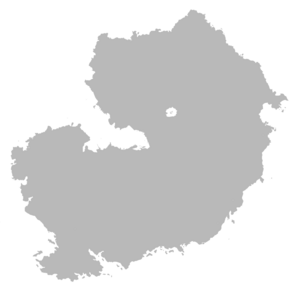Sarpolevantia: Difference between revisions
mNo edit summary Tag: 2017 source edit |
Tag: 2017 source edit |
||
| (2 intermediate revisions by the same user not shown) | |||
| Line 3: | Line 3: | ||
'''Sarpolevantia''' was a {{wp|supercontinent}} that comprised the modern continents [[Sarpedon]] and [[Levantia]] as well as the subcontinent [[Vallos]] for much of its existence. Sarpolevantia is thought to have begun breaking off from [[Pangea]] together with [[Great Kirav|Great Kiravia]] at the [[Triassic-Jurassic extinction event|Triassic-Jurassic Boundary]] {{circa}} 200 million years ago, establishing itself as one of two supercontinents alongside [[Audonacrona]].<ref>Konsaháken, Vurdhan: ''Paleogeology of Great Kiravia'', [[University of Belarus]], pg. 4-7. 2012.</ref> While [[Vallos]] broke off from Sarpolevantia during the Middle Cretaceous, [[Sarpedon]] and [[Levantia]] remained joined together until the opening of the [[Sea of Canete]] during the {{wp|Zanclean}} period {{circa}} 4.5 million years ago.<ref>Balboa, Maximus: ''A comprehensive history of paleontology'', pg. 21. 2004.</ref><ref>Konsaháken, Vurdhan: ''Paleogeology of Great Kiravia'', [[University of Belarus]], pg. 7-8. 2012.</ref> | '''Sarpolevantia''' was a {{wp|supercontinent}} that comprised the modern continents [[Sarpedon]] and [[Levantia]] as well as the subcontinent [[Vallos]] for much of its existence. Sarpolevantia is thought to have begun breaking off from [[Pangea]] together with [[Great Kirav|Great Kiravia]] at the [[Triassic-Jurassic extinction event|Triassic-Jurassic Boundary]] {{circa}} 200 million years ago, establishing itself as one of two supercontinents alongside [[Audonacrona]].<ref>Konsaháken, Vurdhan: ''Paleogeology of Great Kiravia'', [[University of Belarus]], pg. 4-7. 2012.</ref> While [[Vallos]] broke off from Sarpolevantia during the Middle Cretaceous, [[Sarpedon]] and [[Levantia]] remained joined together until the opening of the [[Sea of Canete]] during the {{wp|Zanclean}} period {{circa}} 4.5 million years ago.<ref>Balboa, Maximus: ''A comprehensive history of paleontology'', pg. 21. 2004.</ref><ref>Konsaháken, Vurdhan: ''Paleogeology of Great Kiravia'', [[University of Belarus]], pg. 7-8. 2012.</ref> | ||
During the Mesozoic Era, Sarpolevantia was home to {{wp|Archosauria|archosaurian reptiles}} like {{wp|Crocodylomorpha|crocodylomorphs}}, {{wp|Dinosauria|dinosaurs}} and {{wp|Pterosaur|pterosaurs}}, these clades already experiencing global distribution since the late Triassic, before the break-up of Pangaea. Early {{wp|Mammaliaformes|mammaliaformes}} would also have inhabited the nascent supercontinent by the time it broke off from Pangea. The [[Kubagne Archipelago]] existed as a major archipelago in an in-land sea of Sarpolevantia during the Early Cretaceous period {{circa}} 130-120 million years ago, one of the only | During the Mesozoic Era, Sarpolevantia was home to {{wp|Archosauria|archosaurian reptiles}} like {{wp|Crocodylomorpha|crocodylomorphs}}, {{wp|Dinosauria|dinosaurs}} and {{wp|Pterosaur|pterosaurs}}, these clades already experiencing global distribution since the late Triassic, before the break-up of Pangaea. Early {{wp|Mammaliaformes|mammaliaformes}} would also have inhabited the nascent supercontinent by the time it broke off from Pangea. The [[Kubagne Archipelago]] existed as a major archipelago in an in-land sea of Sarpolevantia during the Early Cretaceous period {{circa}} 130-120 million years ago, one of the only definitively evidence-based isolated insular paleo-environments.<ref>[[Jour & Leon]]: ''The Kubagne Isles'', [[University of Sainte-Catherine]], pg. 5-12. 1941.</ref> | ||
==See also== | ==See also== | ||
* [[Pangea]] | * [[Pangea]] | ||
* [[Audonacrona]] | |||
* [[Mesozoic Era of Sarpolevantia]] | * [[Mesozoic Era of Sarpolevantia]] | ||
* [[Mesozoic Era of Great Kiravia#Triassic (252 to 201 million years ago)|Mesozoic Era of Great Kiravia | * [[Mesozoic Era of Great Kiravia#Triassic (252 to 201 million years ago)|Mesozoic Era of Great Kiravia § Triassic (252 to 201 million years ago)]] | ||
* [[Kubagne Archipelago]] | * [[Kubagne Archipelago]] | ||
* [[History of paleontology]] | * [[History of paleontology]] | ||
Latest revision as of 13:46, 21 August 2024
| This article is a stub. You can help IxWiki by expanding it. |

Sarpolevantia was a supercontinent that comprised the modern continents Sarpedon and Levantia as well as the subcontinent Vallos for much of its existence. Sarpolevantia is thought to have begun breaking off from Pangea together with Great Kiravia at the Triassic-Jurassic Boundary c. 200 million years ago, establishing itself as one of two supercontinents alongside Audonacrona.[2] While Vallos broke off from Sarpolevantia during the Middle Cretaceous, Sarpedon and Levantia remained joined together until the opening of the Sea of Canete during the Zanclean period c. 4.5 million years ago.[3][4]
During the Mesozoic Era, Sarpolevantia was home to archosaurian reptiles like crocodylomorphs, dinosaurs and pterosaurs, these clades already experiencing global distribution since the late Triassic, before the break-up of Pangaea. Early mammaliaformes would also have inhabited the nascent supercontinent by the time it broke off from Pangea. The Kubagne Archipelago existed as a major archipelago in an in-land sea of Sarpolevantia during the Early Cretaceous period c. 130-120 million years ago, one of the only definitively evidence-based isolated insular paleo-environments.[5]
See also
- Pangea
- Audonacrona
- Mesozoic Era of Sarpolevantia
- Mesozoic Era of Great Kiravia § Triassic (252 to 201 million years ago)
- Kubagne Archipelago
- History of paleontology
- Paleontology in Yonderre
Notes
- ↑ Balboa, Maximus: A comprehensive history of paleontology, pg. 8. 2004.
- ↑ Konsaháken, Vurdhan: Paleogeology of Great Kiravia, University of Belarus, pg. 4-7. 2012.
- ↑ Balboa, Maximus: A comprehensive history of paleontology, pg. 21. 2004.
- ↑ Konsaháken, Vurdhan: Paleogeology of Great Kiravia, University of Belarus, pg. 7-8. 2012.
- ↑ Jour & Leon: The Kubagne Isles, University of Sainte-Catherine, pg. 5-12. 1941.